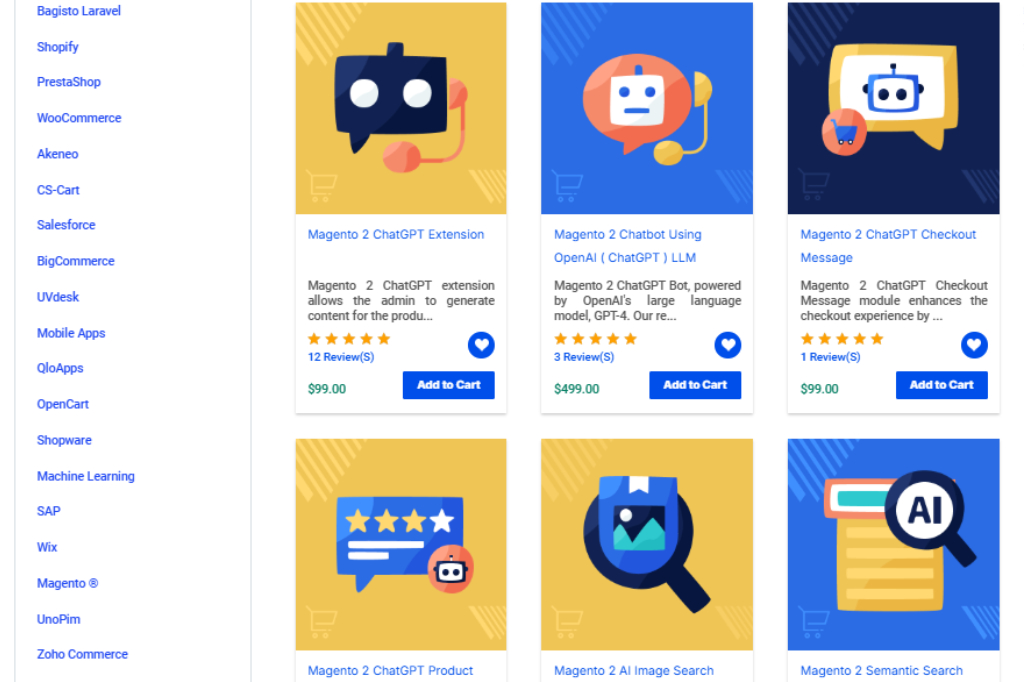The AI Race: A Look at How Top eCommerce Platforms Are Building Smart Shopping Experiences
If two years ago, any AI feature seemed like a futuristic add-on, nowadays they are quietly becoming the backbone of every smart online shop. From helping customers find the right product faster to predicting what they’ll want next, AI is becoming a necessity for staying competitive.
We’re experts in e-Commerce development services and we’re here to help you choose the right solution for your business.
The AI Features Shaping Today’s eCommerce Experience
Content generation took the spotlight when ChatGPT entered the scene. Since then, AI-generated text has found its place across product descriptions, ad campaigns, and customer communications on many eCommerce platforms. But content creation is just one part of the broader AI evolution retailers are now tapping into.
Take personalized product recommendations, for example. These have long been a cornerstone of online shopping experiences, quietly working in the background to drive conversions. By analyzing individual customer behavior – what they browse, add to cart, purchase, or even hover over – AI helps predict what they’re most likely to buy next. It’s not new, as Amazon has been using it for quite some time now, but it’s consistently effective, and it’s only getting better with more data and smarter models.
Dynamic pricing is another AI feature that has matured without making too much noise. Behind the scenes, algorithms continuously assess a mix of variables like stock levels, demand spikes, competitor prices, location, and even time of day, to fine-tune prices in real time. For merchants, this means staying competitive without the burden of constant manual adjustments.
In fraud prevention, AI is proving just how powerful pattern recognition can be. Older systems relied on fixed rules that were easy for bad actors to game. Modern fraud detection uses machine learning models trained on millions of data points – from IP addresses and device fingerprints to behavioral patterns – to identify suspicious activity instantly. The result is stronger protection with fewer false alarms.
From Neural Search to Virtual Try-On – The New AI Tools Revolutionizing Shopping
Neural search is a particularly exciting development. Unlike traditional search engines that match exact keywords, neural search understands meaning. Built on deep learning, it interprets vague or conversational queries and returns results based on context and intent. That means fewer “no results found” pages and more satisfied customers who quickly find what they need.

Algolia, the leading AI-powered search and discovery platform, has been working relentlessly on a feature called NeuralSearch. This hybrid search engine blends traditional keyword matching with deep learning-powered vector search to understand not only what users type, but what they mean.
All this time, AI chat assistants have evolved dramatically. What started as rigid, FAQ-driven bots has become something much more intelligent. Today’s AI-powered assistants can understand customer intent, hold fluid conversations, and even help complete tasks like placing orders or tracking deliveries. The experience feels less like talking to a script, and more like having a real-time helper always available.
Here, Amazon is leading the way with Rufus, an advanced AI-powered shopping assistant that can understand customer intent in natural language, offer personalized product recommendations, and even autonomously add items to the cart or complete purchases on behalf of shoppers.
And then there’s augmented reality. Virtual try-ons and AR previews are increasingly common in sectors like fashion, beauty, and home decor.These tools blend AI and AR to create a highly personalized, confidence-boosting shopping experience.
In this field, YouCam Makeup developed by Perfect Corp is one of the most advanced virtual try-on solutions in the beauty industry. Its AR-powered SDK allows customers to experiment with makeup, accessories, and hairstyles in real time, offering a level of realism that made major brands like Estée Lauder, Bobbi Brown, and Sephora integrate it to deliver immersive, confidence-boosting shopping experiences.
Magento: Flexible but Fragmented AI Strategy
Magento Open Source is known for its robust flexibility, but when it comes to AI, it doesn’t come preloaded with built-in capabilities. Instead, it leans heavily on extensions and API integrations to bring AI to life.
This modular approach gives merchants the freedom to tailor their tech stack – whether it’s adding intelligent product recommendations, automating content creation, enabling OCR for scanned documents, or integrating neural search.
Extension providers have stepped in to fill the gap with a wide range of AI-powered tools. However, this freedom comes with trade-offs: it requires more technical oversight, careful extension selection, and a strong dependency on ongoing third-party updates. Still, for those who want full control over how and where AI is applied, Magento offers unmatched extensibility.
Latest AI-driven Magento Extensions
Webkul has been actively expanding its AI toolkit for Magento merchants, with extensions that tackle everything from search to personalization. Their AI Search Extension introduces a smarter, intent-based search engine that goes beyond keywords to deliver more accurate results – perfect for stores with large or complex catalogs.

The AI-Powered Chatbot extension enables conversational commerce, helping users with FAQs, product discovery, and basic order support.
For content automation, Webkul also offers modules that use AI to generate product descriptions, saving time and boosting SEO.
Meanwhile, their AI Report Analyzer leverages machine learning to detect sales trends and predict future demand. These tools help bridge Magento’s AI gap and bring advanced, user-friendly intelligence to the platform, without requiring merchants to build custom solutions from scratch.
On the other hand, Adobe Commerce offers a deeply embedded and enterprise-grade AI experience, thanks to its integration with Adobe Sensei and Firefly. Unlike Magento Open Source, Adobe Commerce brings AI to the core of its ecosystem – powering everything from smart search and personalized merchandising to product recommendations and content generation. Its capabilities go far beyond the storefront: merchants can leverage AI for inventory forecasting, demand prediction, and automated campaigns, all within a composable infrastructure.
What makes it stand out is the seamless connection to Adobe’s broader suite of tools like Real-Time Customer Data Platform (CDP) and Journey Optimizer, enabling consistent and intelligent experiences across every customer touchpoint.
The trade-off? While it’s incredibly powerful and scalable, it also comes with increased complexity and cost, making it best suited for larger businesses with the resources to fully harness its potential.
Shopware: Leading the Charge into Agentic Commerce
Shopware is positioning itself on the path of what they call “Agentic Commerce”. In this vision, AI moves from being a passive tool to becoming an autonomous agent that can handle complex commerce tasks, like generating quotes, negotiating terms, and even completing purchases on behalf of merchants and customers.

At the center of this type of commerce is the Copilot, embedded directly in the admin interface starting with version 6.7.1 in July 2025, offering intelligent support, from setting up promotions to answering system queries.
Beyond content generation and other admin automatization tasks, Copilot can send personalized post-purchase messages, such as thank-you notes, order confirmations, delivery updates, and product care tips. These messages aren’t generic; they’re tailored to each customer’s purchase and tone preferences, helping merchants maintain engagement and build stronger brand loyalty.
There is also a powerful AI Image Editor within the Media Manager to automatically crop, embed shadows, add reflections, and craft polished visuals, thus eliminating the need for costly photo shoots.
The platform also supports semantic search, smart promotions, and visual asset tools, all designed to enhance the shopping experience.
That said, many of these innovations are still early-stage and may be restricted to enterprise or higher-tier plans, making widespread adoption a gradual process.
Shopify: AI-Powered and Enterprise-Ready
Shopify is the platform that has taken everyone by surprise in the last months. Although their December Update signalled nothing major – only a few performance improvements – the real breakthroughs are just starting to come into focus… and it’s huge! Shopify is rapidly evolving into an AI-native commerce engine. The new Storefront MCP (Merchant Custom Platform) allows AI tools to interact with a store’s live data in real time, enabling chatbots to browse catalogs, answer personalized queries, build carts, and even trigger checkout. It’s like having a fully-informed sales rep embedded in your storefront, 24/7.
Meanwhile, Shopify’s product catalog is now a global index, accessible to external AI platforms like Perplexity, opening a bold new chapter where Shopify becomes a searchable AI-powered commerce layer.
Merchants also gain full control over chatbot behavior with the Knowledge Base App, defining exactly how AI responds to common questions. These features complement a growing suite of native AI tools: automated product descriptions, AI image editing, smart email campaigns, and Sidekick, the 24/7 assistant for store management.
On the enterprise side, Shopify’s stack now includes ShopifyQL Notebooks for data visualization, Commerce Components API for modular development, and Hydrogen, its headless frontend framework. One thing is clear. Shopify is no more just the go-to platform for small merchants. Major brands like Gymshark and Heinz chose it for their eCommerce operations and we are sure more will follow.
If you want to know more about our list of services at Clever++, please visit our website.




